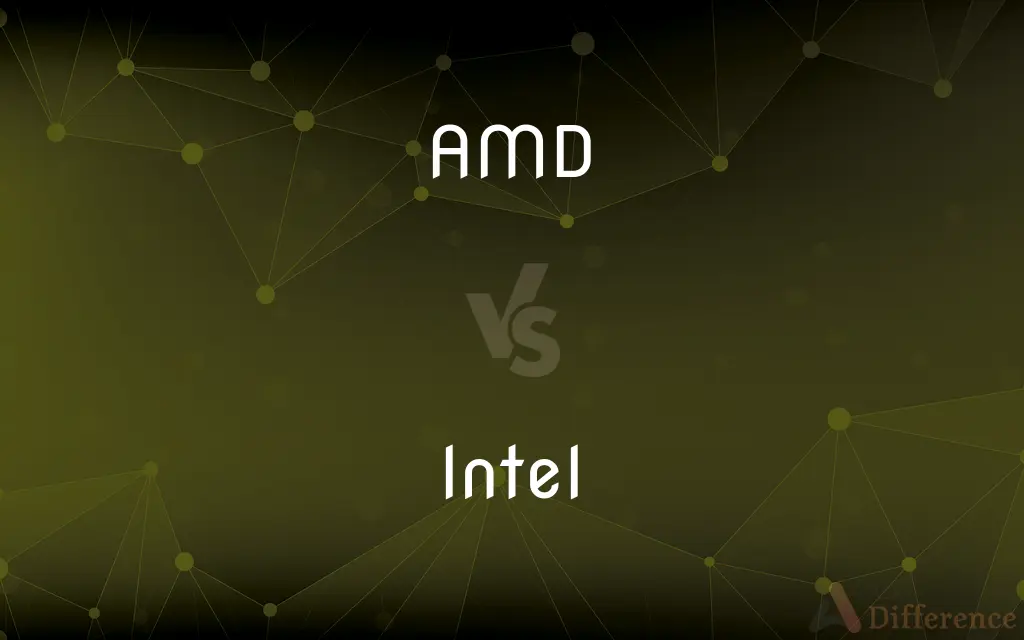AMD vs. Intel — What's the Difference?
Edited by Tayyaba Rehman — By Fiza Rafique — Published on November 12, 2023
AMD and Intel are leading semiconductor companies, specializing in CPUs; Intel historically dominated, but AMD offers competitive alternatives.

Difference Between AMD and Intel
Table of Contents
ADVERTISEMENT
Key Differences
AMD (Advanced Micro Devices) and Intel (Integrated Electronics) are two of the largest semiconductor companies globally, specializing in the development of central processing units (CPUs) for computers. Both have unique architectures and technologies that power millions of devices.
Intel, founded in 1968, has been a dominant player in the semiconductor industry for decades. In contrast, AMD, established a year later in 1969, has often been viewed as the underdog, but it has introduced innovations that challenge Intel's leadership.
Both AMD and Intel have expanded their product lines over the years. While Intel's CPUs are widely recognized, it also ventures into areas like AI, memory, and networking. Similarly, AMD is not just known for its CPUs but also its GPUs, especially after its acquisition of ATI Technologies.
Performance, price, and power consumption are often debated when comparing AMD and Intel processors. Depending on the application, one might be favored over the other. For instance, AMD's Ryzen series has been praised for its multi-core performance, while Intel's Core series is noted for its single-core performance.
Brand loyalty plays a significant role in consumer choice. Some users prefer AMD for its value-for-money and open-source initiatives, while others lean towards Intel for its long-standing reputation and integrated technologies.
ADVERTISEMENT
Comparison Chart
Founding Year
1969
1968
Market Perception
Value-for-money, innovative.
Established, reliable.
Product Range
CPUs, GPUs, APUs.
CPUs, memory, AI technologies.
Notable Technologies
Ryzen, Radeon.
Core, Optane, Thunderbolt.
Business Strategies
Open-source initiatives.
Integrated ecosystems.
Compare with Definitions
AMD
A semiconductor company known for CPUs and GPUs.
I recently upgraded my computer with an AMD Ryzen processor.
Intel
A leading semiconductor manufacturer specializing in CPUs.
My workstation is powered by an Intel Core i7 processor.
AMD
A developer of integrated circuits for personal and enterprise devices.
My laptop runs smoothly thanks to the AMD chip inside.
Intel
A company producing microprocessors, memory, and AI technologies.
Intel's Optane memory accelerates my computer's performance.
AMD
A tech company producing hardware for computers and gaming consoles.
The latest gaming console uses an AMD chip.
Intel
A tech giant with a broad range of computing products.
The new ultrabooks with Intel chips have impressive battery life.
AMD
An Intel competitor in the computer processor market.
For my gaming setup, I chose AMD for its graphic performance.
Intel
An industry leader in the development of computer silicon technology.
With Intel's Evo platform, my laptop's responsiveness has improved.
AMD
An American multinational known for its innovative computer hardware.
AMD's market share has been growing steadily in recent years.
Intel
A multinational corporation with a long history in microprocessor innovation.
Intel has been a household name in computing for decades.
Intel
Secret information or the gathering of such information; intelligence.
Intel
An agency or organization whose purpose is to gather such information.
Intel
Intelligence (secret information)
Intel is important in espionage.
Common Curiosities
Does Intel produce anything other than CPUs?
Yes, Intel produces memory, AI technologies, FPGAs, and more.
Which company is older, AMD or Intel?
Intel was founded in 1968, a year before AMD in 1969.
Who are the main competitors in the CPU market?
AMD and Intel are the primary competitors in the CPU market.
Does AMD have integrated graphics in their CPUs?
Yes, many AMD CPUs come with integrated graphics, often termed as APUs (Accelerated Processing Units).
Has AMD made custom chips for any gaming consoles?
Yes, AMD has developed custom chips for several gaming consoles, including the PlayStation and Xbox.
What are AMD's notable products in the graphics arena?
AMD is known for its Radeon series of graphics cards.
Has AMD ventured into the server processor market?
Yes, AMD has server processors known as EPYC.
Are AMD processors compatible with all motherboards?
No, AMD processors require specific motherboards with compatible sockets, like AM4.
What is Intel's initiative for advanced laptops?
Intel's Evo platform is an initiative that ensures advanced performance, responsiveness, and battery life in laptops.
What are the high-performance CPUs from Intel called?
Intel's high-performance CPUs are from the Core i7 and Core i9 series.
What's a notable technology from Intel for fast storage?
Intel's Optane technology offers fast storage and memory solutions.
Which company's processors are commonly found in ultrabooks?
Intel's processors, especially the Core series, are commonly used in ultrabooks.
Does AMD support open-source initiatives?
Yes, AMD has supported open-source initiatives, especially in graphics technologies.
How do AMD and Intel chips compare in terms of performance?
Performance varies based on the specific chip and use-case. While some AMD chips excel in multi-core tasks, certain Intel chips might perform better in single-core operations.
How does Intel's Thunderbolt technology benefit users?
Intel's Thunderbolt offers high-speed data transfer and the ability to connect multiple devices through a single port.
Share Your Discovery

Previous Comparison
English Bulldog vs. American Bulldog
Next Comparison
UK English vs. US EnglishAuthor Spotlight
Written by
Fiza RafiqueFiza Rafique is a skilled content writer at AskDifference.com, where she meticulously refines and enhances written pieces. Drawing from her vast editorial expertise, Fiza ensures clarity, accuracy, and precision in every article. Passionate about language, she continually seeks to elevate the quality of content for readers worldwide.
Edited by
Tayyaba RehmanTayyaba Rehman is a distinguished writer, currently serving as a primary contributor to askdifference.com. As a researcher in semantics and etymology, Tayyaba's passion for the complexity of languages and their distinctions has found a perfect home on the platform. Tayyaba delves into the intricacies of language, distinguishing between commonly confused words and phrases, thereby providing clarity for readers worldwide.
















































